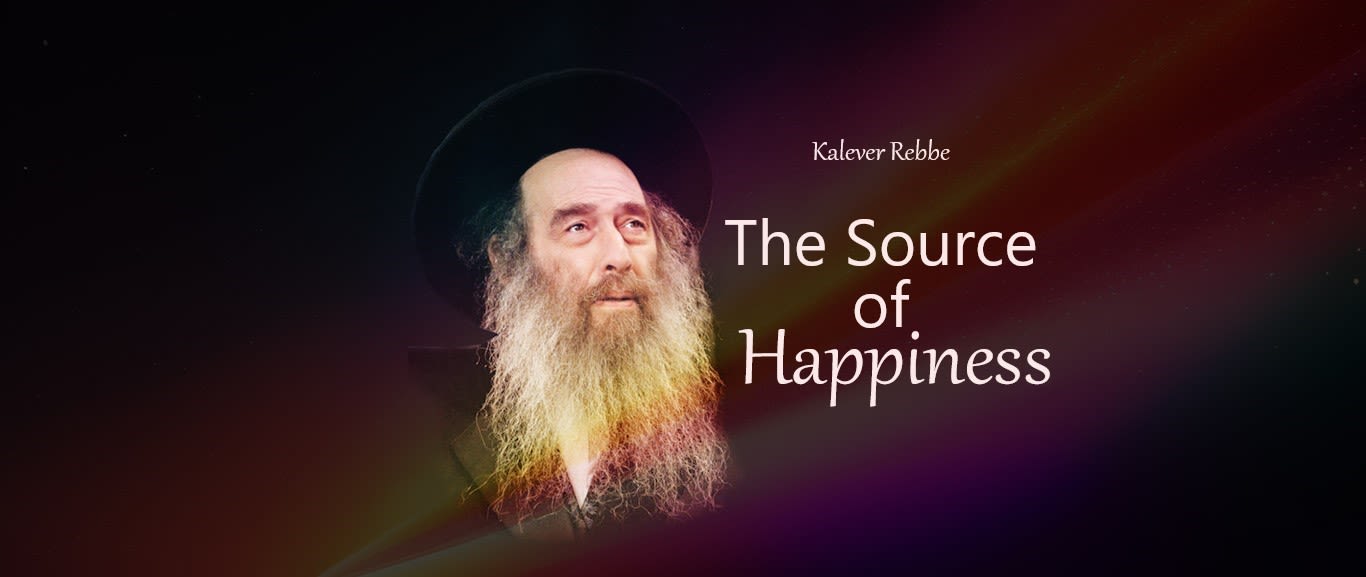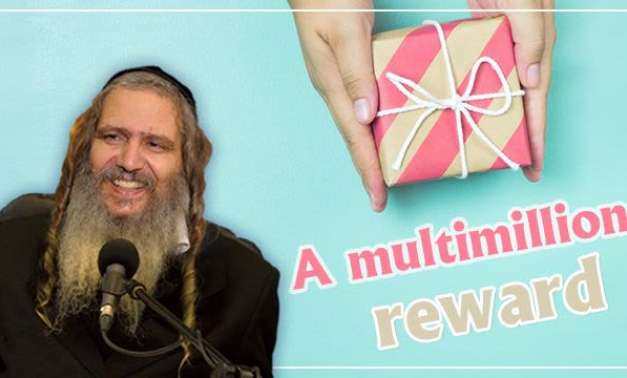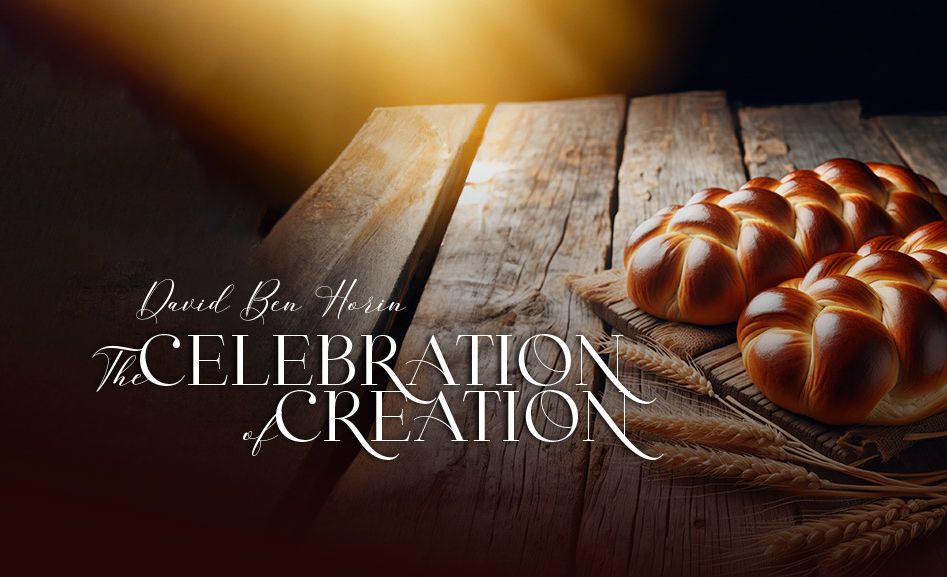
The Source of Happiness
Celebrating Shabbat with the right kind of joy brings This special day calls for special happiness! Let’s bring that joy into the rest of our week.

“[This is] the burnt offering of each Sabbath on its Sabbath, in addition to the continual burnt offering and its libation…” (Bamidbar 28:10)
Shabbat: We Do Things Differently
The Sar Shalom of Belz had a student who would regularly travel to Pressburg. While there, he would visit the Chasam Sofer who would always ask this student to share a few of his Rebbe’s novel Torah insights. The Chasam Sofer would write down the ideas that he especially enjoyed.
The following is one of the 4 original insights that he wrote in the name of Sar Shalom of Belz:
In Parshas Lech Lecha, when describing the relationship between Avraham and Lot, the Torah says (Bereishit 13:6), ולא יכלו לשבת יחדיו – and they could not dwell (L’shevet) together…
During the week, they were able to tolerate one another. However, when “Shabbat” arrived (alluded to by the word “L’sheves” in the pasuk), there was a clear and profound difference between the two of them. Avraham would host a beautiful Shabbat meal for everyone in his household, and they would sing Hashem’s praises and speak about faith and other holy topics. Lot, on the other hand, would sit around with the members of his household and spend their whole time joking around and talking about inappropriate topics. Therefore, on Shabbat they had to separate from each other.
This was the Belzer Rebbe’s insight that the Chasam Sofer wrote down.
Every yid must be careful and aware of their behavior on Shabbat. It is not just another day.
The Torah teaches that Shabbat should be celebrated by (Shemot 20:10), אתה ובנך ובתך – עבדך ואמתך ובהמתך – you, and your son, and your daughter; your manservant, and your maidservant, and your beast… The tzaddikim note that the conjunction word “and” doesn’t appear between the words “daughter” and “manservant”. This creates a clear split in the pasuk, teaching that the yidden and their children need to experience and celebrate Shabbat differently than their “manservant… maidservant… and your beast…”
Guidance From Maimonides
There is a mitzvah to rejoice on Shabbat and Yom Tov. However, mirth and levity are not true simcha and joy.
The Rambam eloquently writes (Hilchos Shevivas Yom Tov 20:6):
“When a person eats, drinks, and celebrates on a festival, he should not let himself become overly drawn to drinking wine, mirth, and levity, saying, “whoever indulges in these activities more is increasing [his observance of] the mitzvah of rejoicing.” For drunkenness, profuse mirth, and levity are not rejoicing; they are frivolity and foolishness.
“And we were not commanded to indulge in frivolity or foolishness, but rather in rejoicing that involves the service of the Creator of all existence. Thus, (Devarim 28:47) states, “Because you did not serve God, Your Lord, with happiness and a glad heart with an abundance of prosperity.” This teaches us that service [of Hashem] involves joy. And it is impossible to serve Hashem while amid levity, frivolity, or drunkenness”.
The Captured Prince
The simcha and enjoyment on Shabbat needs to be spiritual. It says (Tehillim 37:4), והתענג על ה’ ויתן לך משאלות לבך – So shall you delight in the Lord, and He will give you what your heart desires. Chazal explained (Shabbat 118b) that this pasuk is referring to enjoying Shabbat through Avodat Hashem, Torah, davening, and singing Hashem’s praises. As it says, ישמחו במלכותך שומרי שבת –They shall rejoice in Your kingship – those who preserve the Sabbath…
Eating and drinking is only a tool to achieve spiritual enjoyment. The Toldos Yaakov Yoseif (Parshat Kedoshim) quotes a parable from his Rebbe, the Baal Shem Tov, about a prince who received a letter from his father, the king, while held in captivity. He was so overwhelmed with joy that he wanted to dance. He brought a bottle of liquor to his captors. They were delighted to receive the intoxicating beverage and they danced in celebration. And the prince danced with them. However, he was dancing because of his father, the king.
Every yid has a Neshama, a soul that is literally a G-dly portion from Above that is captured within the physical body. Every Shabbat we receive a flow of holiness from Above. And, this is the most important aspect of Shabbat, and our enjoyment must be from this spiritual and holy gift. However, to celebrate with our captor – our physical bodies, we need to indulge in food and drink. Then, as in the parable, our Neshama and physical bodies can both rejoice on Shabbat, each for their own reason.
True Happiness
If a person observes Shabbat according to its laws and truly experiences the proper enjoyment on Shabbat, it will be evidently clear after Shabbat ends. When a person spiritually rejoices on Shabbat, he will begin his week with a sense of spiritual renewal, holy energy, and excitement. If a person feels that way after Shabbat, his enjoyment on Shabbat was truly spiritual and the simcha was joy rooted in the mitzvah.
However, if someone feels depressed and empty when Shabbat leaves and starts the new week, like the feelings secular people feel after a party, his celebrating and enjoyment on Shabbat was not appropriate. It wasn’t spiritual. It was empty, physical pleasures.
In 1929, at the second meeting of the Agudat Yisroel in Vienna, R’ Yisroel of Chortkov said, that the gathering was clearly for Heaven’s sake and a mitzvah, because the simcha after the first gathering lasted for a long time. This, he explained, is a sure sign that the simcha was a mitzvah. When happiness is not rooted in a mitzvah, it is temporary and after the moment has passed the person is left with sadness.
R’ Yisroel explained, that this is the meaning of the pasuk in Tehillim (68:4) that says, וצדיקים ישמחו יעלצו לפני אלוקים וישישו בשמחה- And the righteous will rejoice, yea, they will exult before Hashem, and they will delight with joy… The tzaddikim find joy before Hashem, by performing mitzvot. When you “rejoice” through performing a mitzvah, then you will “delight with joy” afterwards as well.
The Source of Happiness
Shabbat is the source of true happiness. In zemirot (Mah Yedidis) we say, כל המתענגים בה יזכו לרוב שמחה-all who rejoice will merit great simcha.
Many Baalei Teshuva would tell me that when they first began observing Shabbat it was the first time that they felt true happiness in their lives. Their entire lives were changed by observing Shabbat for the better, and they became happier people. The more someone celebrates Shabbat with Torah, davening, and singing Hashem’s praises, the more simcha they will feel in all other areas of their life.
Our pasuk is alluding to this idea. The phrase “ [This is] the burnt offering (Olat) of each Sabbath” can be read as the elevated experience (Aliyah) someone has on Shabbat depends on how he observes his Shabbat (בשבתו).
And the sign that he rejoiced properly on Shabbat is evident on the endurance of that joy, as the pasuk continues: “on the continual burnt offering” (Olas…). In other words, if that elevated experience, that joy is continuous. It depends on “its libation” which alludes to this simcha of the mitzvah. The libations were offered with sacrifice to gladden the people’s hearts.
When a yid enjoys Shabbat spiritually, when they rejoice through its holiness, that joy will permeate through all aspects of their life and have an enduring effect.
**
The Kalever Rebbe is the seventh Rebbe of the Kaalov Chasidic dynasty, begun by his ancestor who was born to his previously childless parents after receiving a blessing from the Baal Shem Tov zy”a, and later learned under the Maggid of Mezeritch zt”l. The Rebbe has been involved in outreach for more than 30 years and writes weekly emails on understanding current issues through the Torah. Sign up at www.kaalov.org.









Tell us what you think!
Thank you for your comment!
It will be published after approval by the Editor.